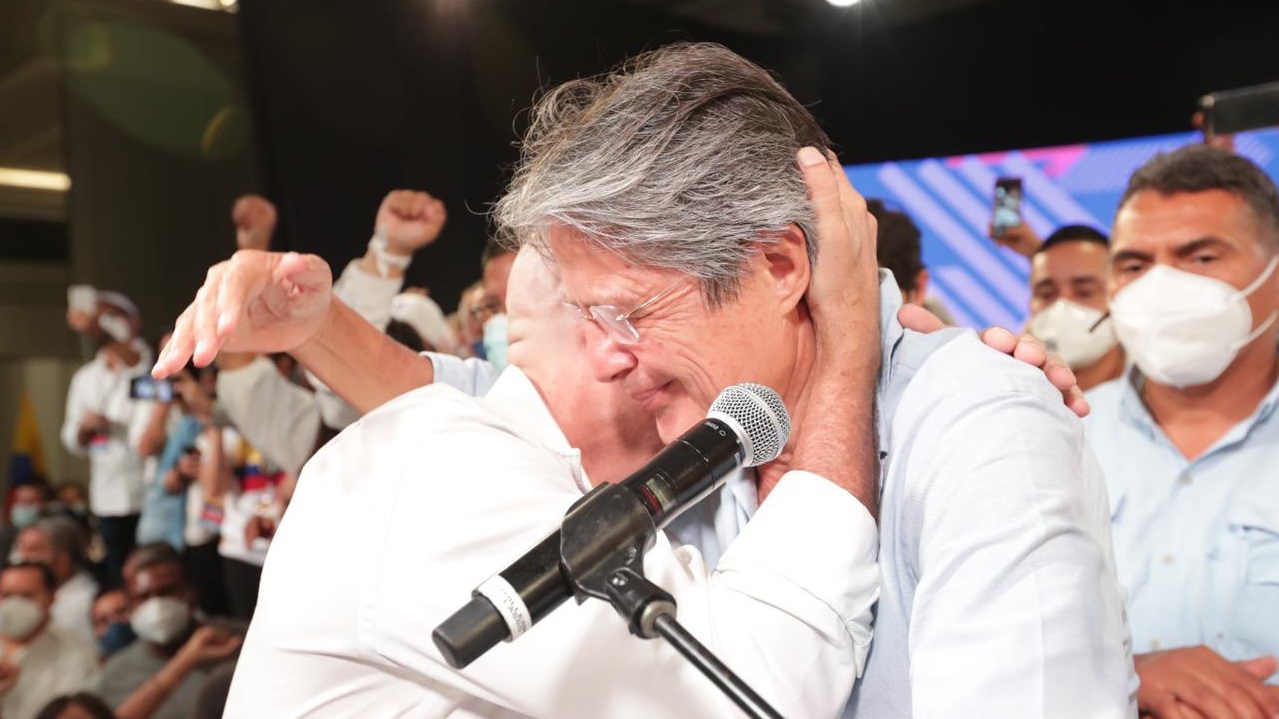Guillermo Lasso of the right-wing coalition of Creating Opportunities party (CREO) and Social Christian Party (PSC) won the second round of presidential elections held in Ecuador on April 11. According to the preliminary results released by the National Electoral Council (CNE), with 98.83% of the votes counted, Lasso obtained 52.41% of the votes. Meanwhile, his opponent, Andrés Arauz of the progressive Union for Hope alliance (UNES), who won the first round and was projected as the winner of the run-off in opinion polls, secured 47.59% of the votes.
In a press conference on Sunday night, Arauz conceded his defeat and said that he would call Lasso to congratulate him on the victory. Arauz said that “it is an electoral setback, but in no way it is a political or moral defeat because our project is for life. It is a fight to organize and build a more just and supportive future for all Ecuadorians, for the entire nation.”
Arauz added that their party would continue defending the interests of the majority of Ecuadorians using their legislative powers. He said that they would show the ruling government their “democratic convictions of being able to continue contributing to the development of the country when it comes to benefiting the majority of our people, and to oppose constructively and responsibly when it is simply seeking to benefit only a few.” Arauz thanked the millions of Ecuadorians who voted for him and trusted him, and said that “today is not the end, it is the beginning of a new stage of reconstruction of popular power.”
The new president-elect Lasso also thanked the citizens for their support. “It is a historic day. Today we begin to work harder than ever and to build the country that we all want and deserve: the Ecuador of the encounter, with employment, health, education, inclusion, equity and security for all,” wrote Lasso on his social media accounts.
Various right-wing leaders from across Latin America and the Caribbean felicitated Lasso. Former Ecuadorian president and Arauz’s mentor, Rafael Correa, also sent his best wishes to Lasso and urged him to stop the lawfare. “‘It is not an end but a beginning,’ said Andrés. Thanks to everyone for your support. We honestly believed we were winning, but our projections were wrong. Good luck to Guillermo Lasso, his success will be that of Ecuador. I only ask you to stop the lawfare, which destroys lives and families,” tweeted Correa.
Arauz’s running mate Carlos Rabascall also congratulated the new president-elect on his victory and added that the future of Ecuador is in his hands. “Congratulations to Guillermo Lasso, in your hands is the future of the country and its people, govern wisely and for the benefit of the great majorities that deserve a supportive government. I wish you success, as your success will be that of the entire country,” wrote Rabascall in a tweet.
Lasso will take office as the new head of state on May 24, while the newly elected legislators will be sworn in on May 14. This was Lasso’s third bid to become president. In 2013, he bagged the second highest number of votes after Correa who won a second term with more than 57% of the votes. In 2017, he lost to Lenin Moreno in the second round.
65-year-old Lasso, a conservative banker, faces the challenge of alleviating the economic, health and social crises caused by Moreno’s austerity policies and exacerbated by the COVID-19 pandemic. The progressive sectors doubt that the situation will change as they believe that Lasso, doesn’t have anything different to offer than what the present government is providing.
On April 11, around 13 million Ecuadorians had the opportunity to vote and elect the country’s new president and vice-president. In the country, the vote is obligatory for all aged between 18 and 65. However, over 17% of the electorate didn’t vote, while around 16% of the people cast a spoilt vote. This means that 33% or one-third of eligible voters chose not to participate. Political experts consider that Lasso has benefited from this ballot-spoiling campaign led by Indigenous leader Yaku Pérez of the Pachakutik Plurinational Unity Movement party, who did not make it to the run-off and alleged that an electoral fraud had been committed.





